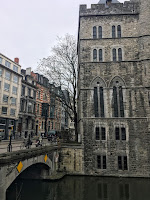Today we are leaving the medieval city of Bruges for another one. Actually, our next point destination is Ghent. However, before departing we look at the historical centre of Bruges once more.
Well, we go to Ghent by train. The ticket from Bruges costs 6.80 euro, and only 30 minutes divide these two charming towns.
At this time we are staying at the loft apartment, which we had booked through the Airbnb service. The place is not superb, but it is spacious and with unique atmosphere.
In reality, we paid only for one room, but, luckily, the hosts moved out somewhere, therefore the entire flat was in our possession.
In reality, we paid only for one room, but, luckily, the hosts moved out somewhere, therefore the entire flat was in our possession.
The apartment is located at the distance of 30 minutes walking from the city centre. It is rather far, but the pedestrian area is quite friendly.
Some historical background. The first mention of Ghent dates back to 630. By the 13th century it was one of the largest towns in northern Europe. Its astonishing prosperity was primarily based on the manufacture of cloth. Eventually, at the medieval times it became one of the most important cities in Europe.
Fortunately, Ghent suffered little bomb damage during the two world wars, and the historical site has remained largely intact. So, we can admire its numerous ancient buildings these days.
It is an amusing fact, but being between Bruges and Brussels, this city was often underestimated by tourists. Honestly, I wish this city would keep its title of "the best-kept secret in Europe" any longer.
It is an amusing fact, but being between Bruges and Brussels, this city was often underestimated by tourists. Honestly, I wish this city would keep its title of "the best-kept secret in Europe" any longer.
One of the prominent corner of the city is the 89-meter-tall Saint Bavo Cathedral. It is not only the bright example of Romanesque, Gothic and baroque architecture, but also a residence for priceless paintings, sculptures, screens, memorials and carved tombs. Among such art treasures is the 24-panel altarpiece "The Adoration of the Mystic Lamb", completed by Jan van Eyck in 1432.
Nowadays Ghent is a modern and trendy city. It is often described as the city with a lively alternative scene and strong student presence. Besides, it is the perfect place for design lovers, seekers for cool restaurants and all kind of unique shops, which you unlikely find, for example, in more conservative Bruges.
Personally, I did not have enough time to take a closer look at social life in Ghent, but I loved this city for its numerous beautifully decorated buildings, grand churches, pristine canals and romantic bridges.
After a short break I continued the exploration of the city at night. Indeed, it is one of the rare cities, which magically transforms by illumination. Mystical Ghent.































No comments:
Post a Comment